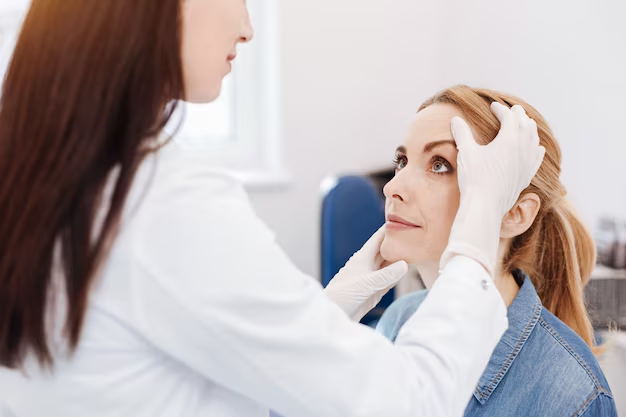Your Guide to Will Medicare Pay For Blepharoplasty
What You Get:
Free Guide
Free, helpful information about Medicare Insurance and related Will Medicare Pay For Blepharoplasty topics.
Helpful Information
Get clear and easy-to-understand details about Will Medicare Pay For Blepharoplasty topics and resources.
Personalized Offers
Answer a few optional questions to receive offers or information related to Medicare Insurance. The survey is optional and not required to access your free guide.
Will Medicare Cover Your Eyelid Surgery? Here's What You Need to Know!
When it comes to medical procedures, Medicare can often seem like a maze of coverage rules and stipulations. Blepharoplasty, or eyelid surgery, is no exception. This popular procedure is commonly undertaken for both cosmetic and functional reasons, making it a little trickier to determine whether or not Medicare will pick up the tab.
Understanding Medicare Coverage for Blepharoplasty
Medicare is primarily designed to cover medically necessary procedures. This means that for medication or surgery to be covered, it generally must be deemed essential for your health. However, many people seek blepharoplasty for aesthetic reasons alone, which typically does not meet Medicare’s criteria for coverage. But if you are experiencing vision impairment due to droopy eyelids, there's a good chance that Medicare will step in to help.
When Will Medicare Pay for Blepharoplasty?
Medicare coverage for blepharoplasty largely depends on medical necessity. Here are the situations where Medicare might cover the procedure:
Vision Obstruction: If you have droopy eyelids that significantly obstruct your line of sight, causing problems with activities like reading or driving, Medicare may consider the surgery necessary.
Documented Medical Evidence: Medicare typically requires thorough documentation from your healthcare provider, proving that your eyelid condition affects your daily life. This documentation can include visual field tests or photographic evidence showing the extent of your eyelid drooping.
In these medically justified cases, Medicare Part B might cover the procedure, subjecting it to an 80/20 coverage rule after any deductibles are met.
Exploring Additional Financial Assistance
Even with Medicare coverage, out-of-pocket costs can still be a financial burden. Fortunately, there are programs and options to help manage the expense. Consider these avenues for additional support or relief:
Medicaid and State Assistance Programs: Depending on your financial situation and state of residence, Medicaid may offer supplementary aid. Check your state’s specific guidelines for additional surgery coverage.
Financial Assistance from Nonprofits: Organizations such as Mission Plasticos or Face Forward provide aid for medically necessary surgeries for those unable to afford them.
Flexible Spending Accounts (FSA) or Health Savings Accounts (HSA): These accounts allow you to save pre-tax dollars to pay for medical expenses. It’s worth considering if anticipating any hefty healthcare cost burdens.
Medical Payment Plans: Many healthcare providers offer payment plans. These plans spread the costs over time, making the financial strain more manageable. Always inquire with your surgeon’s office if such a plan is available.
Moving Beyond Surgery: Exploring Broader Support Options
Blepharoplasty is just one area where financial concerns may arise. If you're exploring larger financial strategies to alleviate personal or medical debt, numerous other options can provide relief:
Education Grants and Scholarships: Ideal for career advancement, these can lead to better job prospects and increased earnings.
Credit Counseling: Nonprofit agencies offer sessions to help manage debts and establish a budget you can follow.
Government Aid Programs: Programs like SNAP or LIHEAP provide crucial support, ensuring essential needs such as food and energy costs are more manageable.
Key Financial Assistance Resources for Medical Needs
- 🔍 Medicaid & State Programs: Evaluate your eligibility for extended coverage options.
- 🌍 Nonprofits: Look for organizations that assist with medical costs.
- 💳 Flexible Accounts: Consider using FSA or HSA for tax-free savings.
- 💵 Payment Plans: Discuss with providers about spreading out costs without interest.
- 🎓 Education Grants: Enhance your qualifications for potential income growth.
- 🧾 Credit Counseling: Gain insights on efficient debt management.
- 🏠 Government Aid: Explore various federal and state-funded assistance programs.
In the delicate balance of medical necessity versus cosmetic improvement, understanding Medicare’s coverage boundaries for blepharoplasty helps you plan better financially—and exploring supplemental financial options ensures you’re supported in more ways than one.
What You Get:
Free Medicare Insurance Guide
Free, helpful information about Will Medicare Pay For Blepharoplasty and related resources.

Helpful Information
Get clear, easy-to-understand details about Will Medicare Pay For Blepharoplasty topics.

Optional Personalized Offers
Answer a few optional questions to see offers or information related to Medicare Insurance. Participation is not required to get your free guide.


Discover More
- Am I Elgible For Medicare
- Am I Enrolled In Medicare
- Am I Qualified For Medicare
- Are Adult Diapers Covered By Medicare
- Are Chemotherapy Drugs Covered By Medicare Part d
- Are Colonoscopies Covered By Medicare
- Are Covid Tests Covered By Medicare
- Are Cpap Machines Covered By Medicare
- Are Cpap Supplies Covered By Medicare
- Are Dental Implants Covered By Medicare
